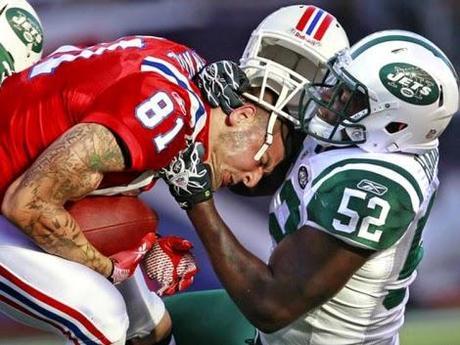 (This image of football violence is from the website SHED Avenue.)
(This image of football violence is from the website SHED Avenue.)“Football is a moral abomination. We’re not just talking about people limping at the age of 50. We’re talking about brain injuries that are causing horrible, protracted, premature death. This…is appalling. Can you point to another industry in America which, in the course of doing business, maims a third of its employees?”
Malcolm Gladwell (writer for the New Yorker)
I want to start by saying I am a huge football fan at all levels, and have been nearly all of my life. Since they started in 1960, I have missed only one Dallas Cowboys game (either in person, on TV, or on the radio if blacked out) -- and that was when I was in the operating room (Sept. 2005) after having been shot in the stomach by a carjacker. Even then, after waking up, my first question was "Did the Cowboys win?".
The idea of having no football is not one that I like. But after seeing recent data, not only on the growing number of football injuries, but also on the brain damage that playing football can cause players (possibly shortening the lives of many), I reluctantly believe it is time for this nation to have a discussion about the violence in the game. Can the game be changed to better protect players? Or must it be banned? These are valid questions, whether we fans like them or not.
My friend Jack Cluth, who writes the excellent blog What Would Jack Do?, has written a very good post on this question -- and I reprint most of it here in the hope of giving it a bit wider readership. Mr. Cluth says:
Football has always been a tough game, and the professional version has become significantly more dangerous as players have become faster and stronger with the passage of time. A friend who spent time in the NFL once described it to me as enduring an automobile accident on every single play. For those of us who’ve experience an auto accident…and have no desire to repeat it…that’s a pretty powerful image. The human body was not designed to absorb repeated high speed impacts of the sort a football player experiences during a game. Multiply that by 16 games (not including preseason and playoff games) and over an average 3-4 year professional career (or longer)…and by the time a player is 25 or 26 there’s a very good chance they’ll be damaged goods. Concussions, memory issues, joint damage…the list is lengthy and the damage can last a lifetime. Repeated head trauma can lead to significant brain trauma and long-term impairment. There’s also research showing that playing in the NFL can adversely effect a player’s life expectancy What of Gladwell’s assertion that football is “a moral abomination?” No one forces players to take the field, and those who play the game understand the risks they take. They know that every time they step on the field could be their last. A catastrophic, career-ending injury is never far away, and there’s no way for an athlete to know when their time is up. What they may not understand so well (or not be willing to admit or recognize) are the long-term effects of playing football that may be with them for the rest of their lives. As one whose years of contact sports is exacting a toll on, I’m here to tell that denial is a powerful thing. There’s something to be said for the perception of the invicibility of youth. As much as I want to reject Gladwell’s premise, I recognize that my reasons for wanting to do so are purely emotional. When I look at his argument rationally, it’s difficult to refute. He’s right; what other industry maims fully 1/3 of its employees? If any other industry were to do that, the hue and cry demanding reform would be loud and long…and completely justified. Yet we allow football to continue its carnage because we love the gladiatorial nature of the game. We love the primal, physical nature of football; it’s as close to combat as the civilian world comes. Football is what George Will once called “violence punctuated by committee meetings.” It’s the violence, and the toll it exacts on players that’s becoming increasingly difficult to ignore. The concern has reached the point where many professional athletes- LeBron James(who played in high school) chief among them- won’t allow their children to play football. Because of the heightened concerns- particularly surrounding head injuries- participation in youth league and high school has dropped. This doesn’t bode well for the future of the game; unless something is done to reduce the carnage, there may not be a long term future for football. For the NFL, a multi-BILLION dollar enterprise, this is no small concern. Theodore Roosevelt once saved football when it turned deadly at the beginning of the 20th century. The college and high school game was even more brutal than it is today, killing dozens and placing the future of the game in peril. Roosevelt urged a number of reforms that ultimately gave birth to the game we know it today…but it appears that history is repeating itself. Without significant reforms, football may well die. Without change, the degree and severity of physical damage to players simply isn’t sustainable. Then again, there’s no arguing it’s better for the game to die than its participants. Should football be banned? That’s a debate this country may well need to have- and soon- but I can’t help but wonder how many more young men will have to be maimed or die before we take that question seriously.

